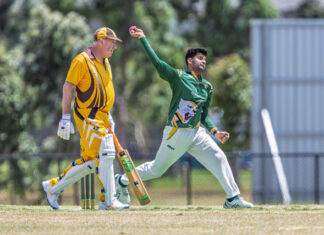WAR. A word that evokes images of wounded men lying in trenches, young men opening fire and servicemen returning to their loved ones.
But spare a thought for the women involved, including two of our own – Thelma Rhein and Joan Hayles.
The Pakenham RSL ladies also have a story to tell, and although they may not have been wounded in World War II they still bear emotional scars more than 50 years on.
“The ladies have always been important but not given the recognition,” Pakenham RSL president Ray Caldwell says.
“There are stories that haven’t been told and these ladies are sitting on other stories but it’s difficult to dig back after all these years, it’s the very thing we want to forget.”
For Joan, 85, those memories are the gunshots and amputations she saw during her time repairing the wounded.
As a nurse based at Ballarat, she worked at camp hospitals in Bendigo and Balcombe, often witnessing the unthinkable.
Australian soldiers wounded in New Guinea were sent home – sometimes smelling of death.
“They were just plastered up and sent home … you could smell them,” Joan recalled. “The blood would go through the plaster and you could really smell them.”
Some of the soldiers didn’t just smell like death – they were inches away from it.
“There was one boy, he was found in the jungle, he had been shot in the face and he had lay in the jungle unconscious for quite a while. Maggots got to him and took half his face,” she said.
“They hadn’t found him for a few days but that’s what happened to him.
“Those sorts of things you see are terrible. In those days they didn’t have what they’ve got now in terms of skin grafts.”
Thelma intended to join the war effort as a nurse, but soon found herself working for the air force. She began her post at Bundoora, where the force had taken over half of a mental asylum.
“I went in to be a nurse but I ended up as a stewardess because they were short,” she said.
“I saw some sad cases with diseases and you make friends and they go, that’s what I saw out there, that was very sad.”
Thelma was 18 when she joined the war effort, acting upon the advice of her father who was a soldier at Gallipoli.
“I can’t tell you what I was doing before I joined up, but my father said it would do me good,” she said.
Thelma was well aware of the horrors of war – she has never forgotten the letter her father wrote to her mother during his battles in Turkey.
“My father wrote during the war that there were so many dead in his trenches that he was writing to mum and there was nowhere to sit – he had to sit on dead bodies.
“I saw it with my own eyes, what he wrote. It was very sad – it must’ve been a terrible war that one.”
Joan was called up in 1943 at age 19. Working as a nurse was challenging but it did have its up sides, such as getting to know the men who came in for treatment.
“I met my hubby Bill when he came back as a prisoner of war,” he said.
“He was one of my patients.
“A lot of prisoner war boys came back and were taken there for their rehabilitation and that’s where I met him.”
Bill worked on the Burma Railway and spent time in the Changi prisoner of war camp. Later, he worked in the coal mines in Japan.
“He was over there when they dropped the bomb,” Joan said.
“He was one of the lucky ones actually to get from one stage to the other, because a lot of them lost their lives out at sea with the Americans believing they were Japanese soldiers on board those boats, but they were ours and their own too.”
Joan was discharged in August 1946 and married Bill that December.
The couple lived in Chelsea before moving to Pakenham where they raised five children. Joan has resided in Pakenham for the last 55 years, more than half of that time without Bill who died in 1972.
Thelma also married shortly after the war. She met her husband Robert while working in the ticket box at a Melbourne theatre.
“I married a sailor … my father said he’d shoot him, I had to go to Adelaide for that one,” she joked. “No, he was going to Darwin so I went over there and married him in South Australia.”
Joan has been involved with the Pakenham RSL for the past 20 years or so, while Thelma joined up after moving from Noble Park 12 years ago.
The club gives Thelma and Joan, along with its two other female members Rae Webster and Iris Coop, the opportunity to share their war experiences.
Mr Caldwell says it’s unfortunate that few people outside the organisation are interested in hearing the women’s stories.
“The ladies were just as important,” he said.
And Mr Caldwell, a Vietnam veteran, says Joan and Thelma may one day divulge more of their stories, but that’s all for now.
“It’s hard to get started, the stories don’t flow because they are stories you don’t want to remember,” he said.
“It’s always been a hassle and we’re all, for sure, going to the grave with a lot of stories untold.”
Get the latest news to your email inbox FREE!
REGISTER




